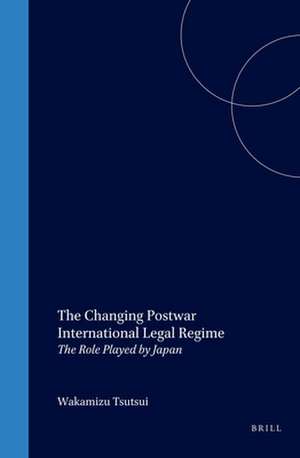The Changing Postwar International Legal Regime: The Role Played by Japan: International Law in Japanese Perspective, cartea 8
Autor Wakamizu Tsutsuien Limba Engleză Hardback – 30 sep 2002
Japan recovered her independence by concluding a Security Treaty with the United States based on the right of self-defense. Even after the conclusion of the Cold War, they have chosen to strengthen the Treaty rather than give effect to Japan's "Peace Constitution". Other states are also caught up in the same current, taking actions not precluded by the UN Charter. Whatever regime should follow the present one, it will draw more on the humanity principle based on "freedom of conscience".
This work should be read by anyone interested in the development of international law and its influence on international relations.
Preț: 665.06 lei
Preț vechi: 811.05 lei
-18% Nou
Puncte Express: 998
Preț estimativ în valută:
127.27€ • 138.20$ • 106.91£
127.27€ • 138.20$ • 106.91£
Carte indisponibilă temporar
Doresc să fiu notificat când acest titlu va fi disponibil:
Se trimite...
Preluare comenzi: 021 569.72.76
Specificații
ISBN-13: 9789041118479
ISBN-10: 9041118470
Pagini: 208
Dimensiuni: 160 x 240 x 17 mm
Greutate: 0.48 kg
Editura: Brill
Colecția Brill | Nijhoff
Seria International Law in Japanese Perspective
ISBN-10: 9041118470
Pagini: 208
Dimensiuni: 160 x 240 x 17 mm
Greutate: 0.48 kg
Editura: Brill
Colecția Brill | Nijhoff
Seria International Law in Japanese Perspective
Cuprins
Foreword. Introduction. 1: The changing law in postwar international society. 1. International law as the general order in international society. 2. The international legal order in changed circumstances. 3. The international legal order under the principle of war renunciation. 4. The United Nations ad the positive order in international society. 2: An international legal order achieved through self-defense. 1. The social characteristics of self-defense in the international legal regime. 2. The social functions of self-defense. 3. Regional principles achieved through self-defense. 4. Ensuring humanitarian principles. 3: A postwar international regime characterized by "enemy" status. 1. "Enemy" status resulting from the invalidation of traditional international law. 2. Rehabilitation of an "enemy" state on the basis of the Allies' ideals. 3. The US-Japan Security Treaty in a regional international regime. 4. "Enemy" status liquidated through integration into a regional regime. 5. Concluding remarks. Select Bibliography. Appendix. Index.










